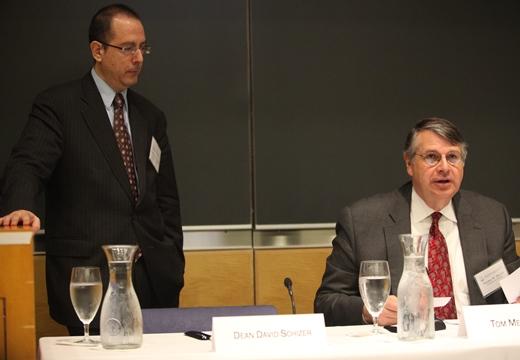A Regulatory Strategy for Hydraulic Fracturing
Dean David M. Schizer and Professor Thomas Merrill Present Paper, "The Shale Oil and Gas Revolution, Hydraulic Fracturing, and Water Contamination: A Regulatory Strategy?" at Richman Center Conference
New York, May, 7, 2013—The United States will be the world’s largest producer of natural gas by 2015 (surpassing Russia), and the largest producer of oil by 2020 (surpassing Saudi Arabia), according to a November 2012 forecast by the International Energy Agency. The key to this startling change in the nation’s energy landscape is hydraulic fracturing, a technique that has released previously inaccessible energy reserves by pumping fluid at high pressure to crack shale and release gas and oil trapped inside.
Although this process offers enormous economic and geopolitical benefits to the United States, and can also reduce greenhouse gas emissions by replacing dirty coal with cleaner natural gas, the process poses various risks, including water contamination. As a result, it needs to be carefully regulated, Columbia Law School Professor Thomas W. Merrill and Dean David M. Schizer said recently at a Richard Paul Richman Center for Business, Law, and Public Policy conference that brought together leading experts on the topic.
| Columbia Law School Dean David M. Schizer and Professor Thomas Merrill |
“The shale boom holds enormous potential benefits for society and should be encouraged,” Merrill and Schizer write in a new paper, “The Shale Oil and Gas Revolution, Hydraulic Fracturing, and Water Contamination: A Regulatory Strategy,” featured at the conference. “At the same time, we need regulation to ensure that it is safe, and that the public believes it is safe. Realizing the potential benefits of fracturing, therefore, requires regulation that is carefully calibrated to minimize the real risks, without deterring socially valuable drilling.” Merrill and Schizer focus on the need for a set of “best practices” regulation and for liability rules to backstop them.
The conference also included the former Governor of Montana, Dave Freudenthal, industry leaders such as Charles Stanley, chairman, president & CEO, QEP Resources, Inc., and experts from environmental advocacy organizations such as Mark Brownstein of Associate Vice President & Chief Counsel of the US Climate & Energy Program, Environmental Defense Fund, and Deborah Goldberg, managing attorney, Earthjustice. For a full list of speakers, see (link to program).
The opinions of individual faculty members, Centers, Clinics, and Programs, do not reflect the views of the Law School as an institution.
